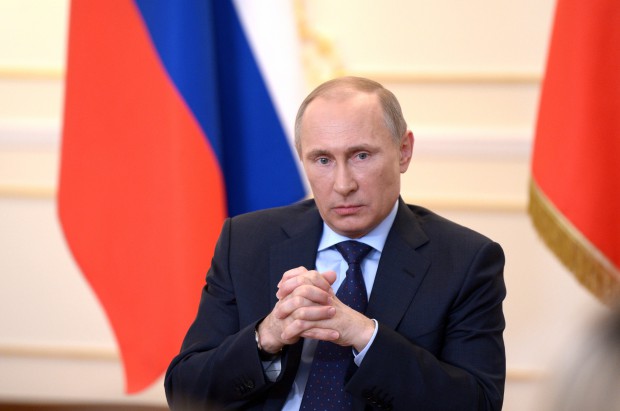If anyone thought Russian President, Vladimir Putin, was a strongman the West could do business with, that delusion has been punctured. Last week, Russian Bear bombers skirted by British airspace. In January, a UK public inquiry into the murder of Alexander Litvinenko, KGB agent turned UK-based dissident, heard he was murdered at Putin’s behest in an ‘act of nuclear terrorism’ on British soil. And Kremlin-backed rebels are ensuring a cease-fire with Ukraine crumbles, leaving the West looking impotent as Putin’s stare shifts menacingly to the Baltic countries of the European Union. But, are we in Britain doing everything we realistically can to curb Putin’s bullying?
Putin’s kleptocracy blurs lines between Russia’s powerful oligarchs and Kremlin stooges. The Russian President couldn’t flex a political muscle without being bankrolled by the mafia. To weaken Putin without becoming embroiled in military conflict, we need to shine a light on his shady paymasters.
With that aim, in 2012, I led a campaign that culminated in Parliament calling on the government to impose mandatory visa bans and asset freezes on individuals linked to or profiting from torture or other egregious violations of international law – in Russia and beyond. The campaign was inspired by Sergei Magnitsky, a Russian lawyer hired by British businessman Bill Browder. Magnitsky was tortured and murdered whilst detained, on instructions from the Kremlin, for exposing a $230 million tax fraud committed by Putin’s cronies – the biggest in Russian history. The UK government refused to legislate, but promised not to allow such perpetrators or blood money into Britain.
And yet, a year later, BBC’s Panorama disclosed shocking evidence of millions of pounds being laundered by organised crime with links to the Kremlin through UK-registered companies – giving dirty Russian money a veneer of British respectability. When I followed up with UK law enforcement agencies on evidence of UK companies linked to the Magnitsky case, I was struck by the lethargic reaction.
Likewise, in response to reports that members of Russian organised crime were freely visiting London, I sought assurances that the sixty prime suspects in the Magnitsky case – already banned from the US – were denied entry into Britain. Home Office officials indicated they were on a watchlist, and wouldn’t be allowed in – but seemed to backtrack under pressure from Moscow. We are still told such nefarious individuals would never be let in – but how can we be sure?
Today, I hope Parliament will amend the Serious Crime Bill to bring some long overdue transparency to Britain’s murky links to Putin’s power base. A first, simple, step is to require the Home Office to publish the names of those it bans from entering the country when it has evidence of their links to serious international crime – including torture, terrorism and money-laundering.
The government says it doesn’t routinely publish the names of those denied entry. Yet, successive Home Secretaries have trailed the names of barred individuals, like American rapper Snoop Dogg or ‘shock-jock’ radio host Michael Savage. If the names of singers and DJ’s banned for being offensive are revealed, why not the identity of those responsible for the worst crimes imaginable? Bringing some transparency to the exercise of these powers would help guarantee they are properly enforced. Parliament’s Foreign Affairs Committee has already recommended disclosing the names of people denied entry on human rights grounds.
Putin’s cronies have made luxurious safe havens in the West’s glitzy capitals. A string of unresolved Russian deaths also suggests they are importing their vendettas into this country – putting British citizens at risk. If we want to this mafia-related violence off our streets, we need to pay closer attention to the people we give visas to. And if we want those bankrolling Putin to think twice about their patron, we should stop allowing them to quietly enjoy their illicit profits here.
Would Putin give a damn? Judging from his own reaction, yes. The Russian Ambassador objected to Parliament even debating this issue in 2012, and Moscow threatens reciprocal measures, if Britain exposes those denied entry. Fine. We’ve got absolutely nothing to lose from that.
My proposal has cross-party backing from former Ministers at the Home Office FCO and Law Officers – and seven Parliamentary Committee Chairmen. And, after a well-publicised dinner with the Clooneys, Ed Miliband was said to be ‘very keen’ on sanctions in response to Sergei Magnitsky’s murder. Tomorrow, we’ll see if that was just PR.
Equally, bringing some transparency to UK visa bans has benefits beyond the Magnitsky case. Whether it’s dealing with rising China or oil-rich Saudi Arabia, public pressure for some moral red-lines in British foreign policy will only grow. The UK needs to be a global player, and that requires engaging with rough regimes on different levels of cooperation. But, it doesn’t mean giving a free pass to people responsible for systematic human rights abuses or those promoting terrorism.
For despots like Mr Putin, naming and shaming the henchmen who prop him up – while refusing them entry into Britain – would hit him where it really hurts.






Comments